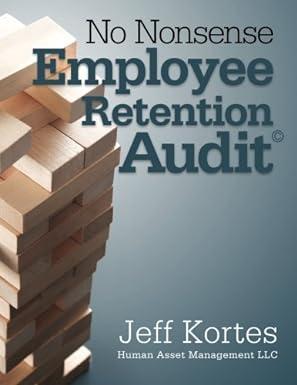Question
Question 1 What is the difference between a defined contribution pension plan and a defined benefit plan? In a defined contribution pension plan, the firm
Question 1
What is the difference between a defined contribution pension plan and a defined benefit plan?
| In a defined contribution pension plan, the firm invests contributions for the employees, who own the value of the funds in the plan. In a defined benefit plan, the firm promises employees a particular dollar benefit payment based on each employee's earnings and years of service. |
| A defined benefit plan is more profitable for employees than a defined contribution pension plan. |
| In a defined benefit pension plan, the firm invests contributions for the employees, who own the value of the funds in the plan. In a defined contribution plan, the firm promises employees a particular dollar benefit payment based on each employee's earnings and years of service. |
| There are no differences between a defined contribution pension plan and a defined benefit plan. |
Question 2
The most important bank liabilities are
| Borrowings and Small-denomination time deposits. |
| Large-denomination time deposits and Checkable deposits. |
| Checkable deposits and Bank capital. |
| Small-denomination time deposits and Checkable deposits. |
Question 3
Why might too much leverage be a problem for an investment bank?
| Leverage magnifies profit, but it also magnifies loss. |
| Too much leverage cannot be a problem for an investment bank. |
| Too much leverage decreases the number of clients. |
| Too much leverage increases the book value against the market value of assets. |
Question 4
How does deposit insurance encourage banks to take on too much risk?
| Deposit insurance encourages banks to increase investments in riskless assets. |
| With deposit insurance, depositors have more incentive to withdraw their deposits if the managers make reckless investments. |
| Banks can make riskier investments because the government has insured banks against losses on their investments. |
| Banks can make riskier investments without worrying about deposit withdrawals because the government has insured depositors against losses. |
Question 5
What are the key differences between mutual funds and hedge funds?
| Mutual fund activities are more transparent and provide a list of the assets that the particular mutual fund owns. Hedge funds are generally less regulated and take more risks for higher returns. |
| Hedge funds are usually partnerships with a relatively small number of wealthy investors, whereas mutual funds usually involve large number of small investors. |
| A and B are correct. |
| Neither A nor B is correct. |
Question 6
What does it mean to describe the foreign-exchange market as an over-the-counter market?
| The market consists of customers linked together by computers. |
| The market consists of market makers linked together by computers. |
| The market is a physical place where currencies are traded. |
| The market consists of customers buying and selling in the foreign-exchange market directly. |
Question 7
The most important bank assets are
| Real estate loans and Commercial/industrial loans. |
| Reserves and Real estate loans. |
| Real estate loans and U.S. government/agency securities. |
| Consumer loans and Reserves. |
Question 8
What is a run on a financial firm?
| A run on a financial firm is not possible thanks to a government safety net. |
| A run on a financial firm is a rush to invest money before everyone else does. |
| A run on a financial firm is an attempt by investors to get their money out before the firm fails. |
| A run on a financial firm is the freezing of all current investing activities by investors. |
Question 9
What effect has the SEC had on the level of asymmetric information in the U.S. financial system?
| The SEC has been successful in completely eliminating the cost of asymmetric information. |
| After the SEC was founded, the level of asymmetric information in the U.S. financial system increased tremendously. |
| The SEC has been successful in reducing the cost of asymmetric information, but it has not eliminated it completely. |
| The SEC has not been successful in eliminating the cost of asymmetric information at all. |
Question 10
Which of the following is true regarding the Securities and Exchange Commission (SEC)?
| The SEC's primary role is to increase adverse selection by requiring the disclosure of financial and accounting information from all publicly traded firms. |
| The SEC is a federal government agency that regulates U.S. stock and bond markets. |
| The SEC's primary role is to reduce moral hazard by requiring the disclosure of financial and accounting information from all publicly traded firms. |
| Both B and C are correct. |
Step by Step Solution
There are 3 Steps involved in it
Step: 1

Get Instant Access to Expert-Tailored Solutions
See step-by-step solutions with expert insights and AI powered tools for academic success
Step: 2

Step: 3

Ace Your Homework with AI
Get the answers you need in no time with our AI-driven, step-by-step assistance
Get Started


